Ever find yourself battling a stubborn cough just when you thought you’d dodged the cold season? Meet elecampane syrup, an age-old remedy, packed with benefits for your respiratory system. This herbal concoction isn’t just a homemade cough syrup; it’s a delightful way to soothe sore throats and support the immune system. Elecampane, or Inula helenium, is no rookie in the world of herbal medicine. It’s been a favorite among Western herbalists for its expectorant properties—perfect for easing those unproductive coughs.
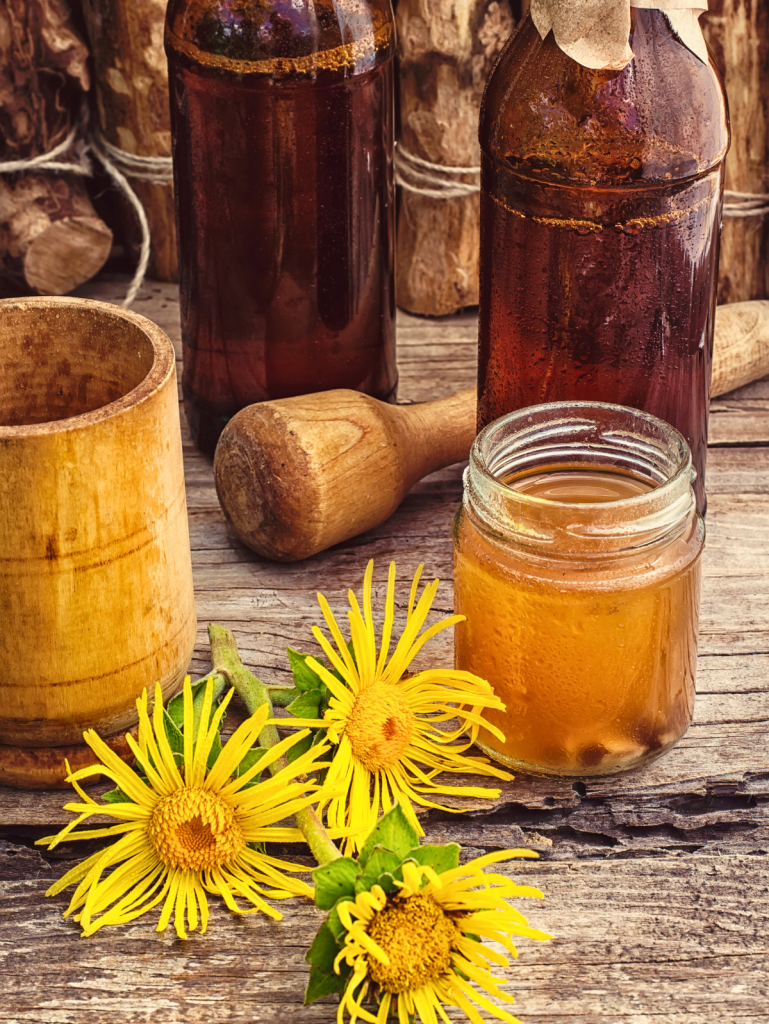
This syrup blends the goodness of dried roots, fresh ginger, and raw honey, creating a harmonious balance that targets mucous membranes and respiratory health. It’s like giving your body a warm herbal hug!
Whether you’re prepping your medicine chest for the winter months or keen on trying new herbal formulas, this recipe offers a particularly good fit.
What is Elecampane?
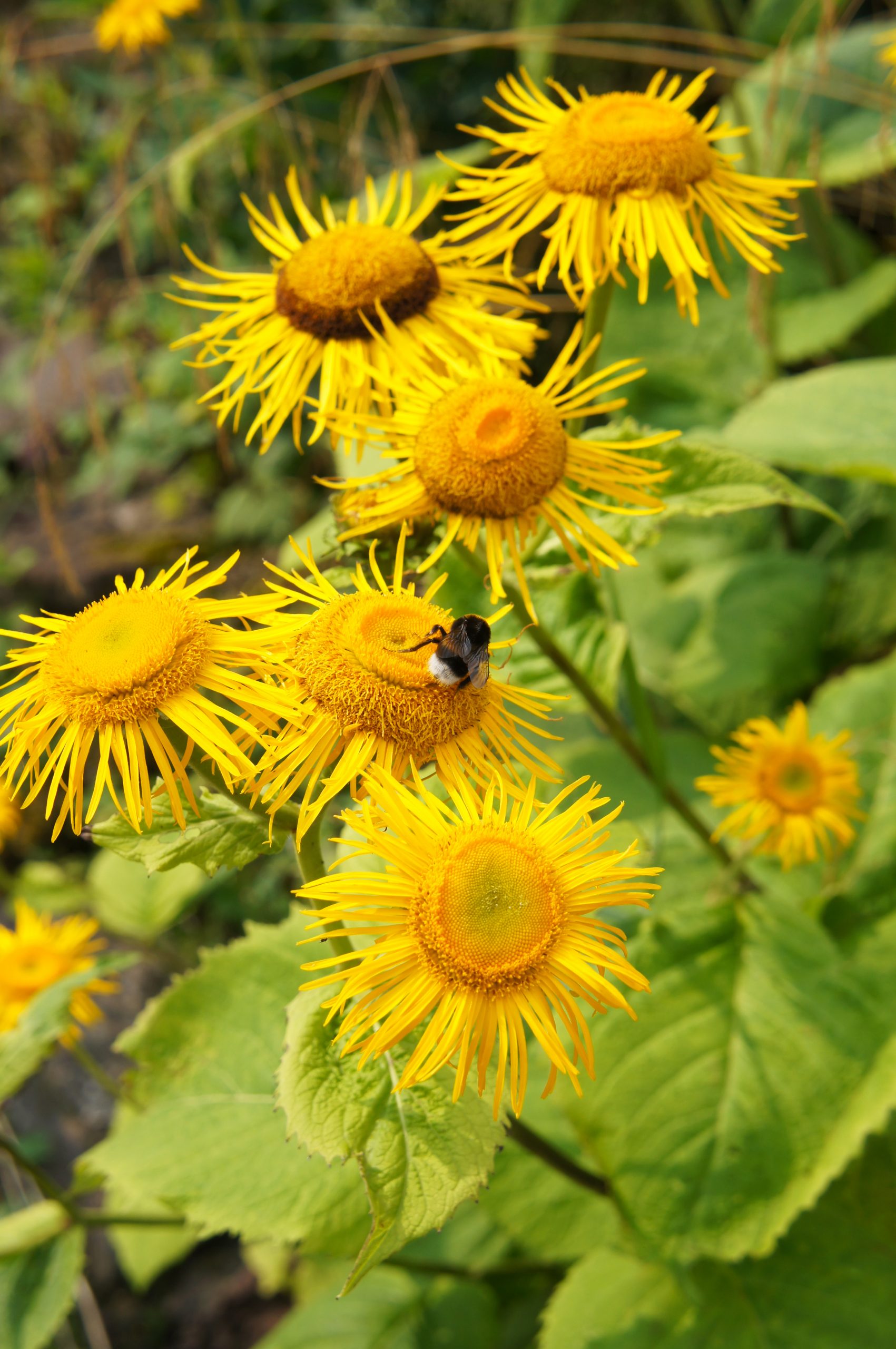
Imagine a plant that not only adds beauty to your garden but also works wonders for your health. Meet elecampane, a vibrant yellow flower, often compared to a sunflower’s smaller sibling. It’s not just a pretty face, though; this plant packs a punch when it comes to herbal medicine. Used for centuries, elecampane, or Inula helenium, has carved its niche in the world of natural remedies with its unique blend of health benefits.
Origins and Characteristics
Elecampane is no spring chicken in the plant world. With roots tracing back to ancient Greece and Rome, it’s been a favorite of herbalists through history. Picture it standing tall, swaying gently in the breeze with its long, sturdy stem and lush, daisy-like petals. This perennial beauty thrives in cool, moist environments, making it a particularly good fit for your garden’s shadier spots.
The Medicinal Powerhouse
Elecampane isn’t just skincare deep; it’s known for its powerful effects on the respiratory system. Touted for its ability to soothe sore throats and cough suppressants, it’s rich in volatile oils and expectorant properties. It helps keep those annoying unproductive coughs at bay, making it a superhero for respiratory infections and health problems.
Think of it as nature’s gentle answer to respiratory woes. When those winter months hit hard, elecampane steps in to bring comfort. And it doesn’t stop there—its mucous membrane-soothing properties make it a must-have for keeping your upper body system in check.

Elecampane’s Herbal Uses
So how exactly do people use this herbal powerhouse? Here are some key ways this aromatic herb transforms into your herbal first aid kit:
- Elecampane Tea: Sip away your sniffles with a warm cup. Combining dried roots and boiling water unlocks the herb’s soothing magic. Want to try making your own? Check out this Elecampane Tea Recipe.
- Homemade Cough Syrup: Have you heard of an elecampane cough syrup recipe? Mix fresh elecampane root with raw honey, apple cider vinegar, and even a dash of fresh ginger for a homemade cough syrup that’s both effective and delicious.
This plant is an effective blend of elder wisdom and modern herbal skill, hinting at the countless ways these wild plants can support our health. With its impressive shelf life, elecampane fits right into your home’s medicine chest—a herbal gift idea that’s truly timeless.

Health Benefits of Elecampane Syrup
Elecampane syrup is like a warm hug for the chilly winter months. Known as Inula helenium, this traditional remedy offers more than just comfort. It’s a herbal medicine favorite, known for its multitude of benefits. Whether you’re dealing with a scratchy throat or want to keep your immune system in top shape, elecampane syrup has some amazing tricks up its sleeve. Let’s explore how this delightful syrup can bring you relief and strength.
Supports Immune System
When the snow starts to fall, so do our chances of catching a cold. Elecampane syrup is an excellent sidekick to have during winter months. Imagine it as a little immune support squad in a bottle, ready to help fight off those pesky germs. The essential oils and other active compounds in elecampane work like a natural first aid kit, giving your immune system the boost it needs. It’s like having a great example of what herbal remedies can do.
Soothes Sore Throats
A sore throat can feel like swallowing a porcupine. Not fun, right? Enter elecampane syrup, a soothing balm for your troubled throat. It lovingly coats the mucous membranes and helps ease discomfort, thanks to its ability to act as a homemade cough syrup. The syrup’s warm, gentle touch feels like a cozy scarf wrapped around your neck. Add it to your collection of natural cold remedies along with some elecampane tea for a soothing sip.
So, next time you’re feeling under the weather, reach for a spoonful of elecampane syrup. It’s like having your grandmother’s wisdom bottled up, ready to whisk away your winter blues and sore throats. Grab a blanket, make a cup of tea, and let this herbal hero work its wonders.
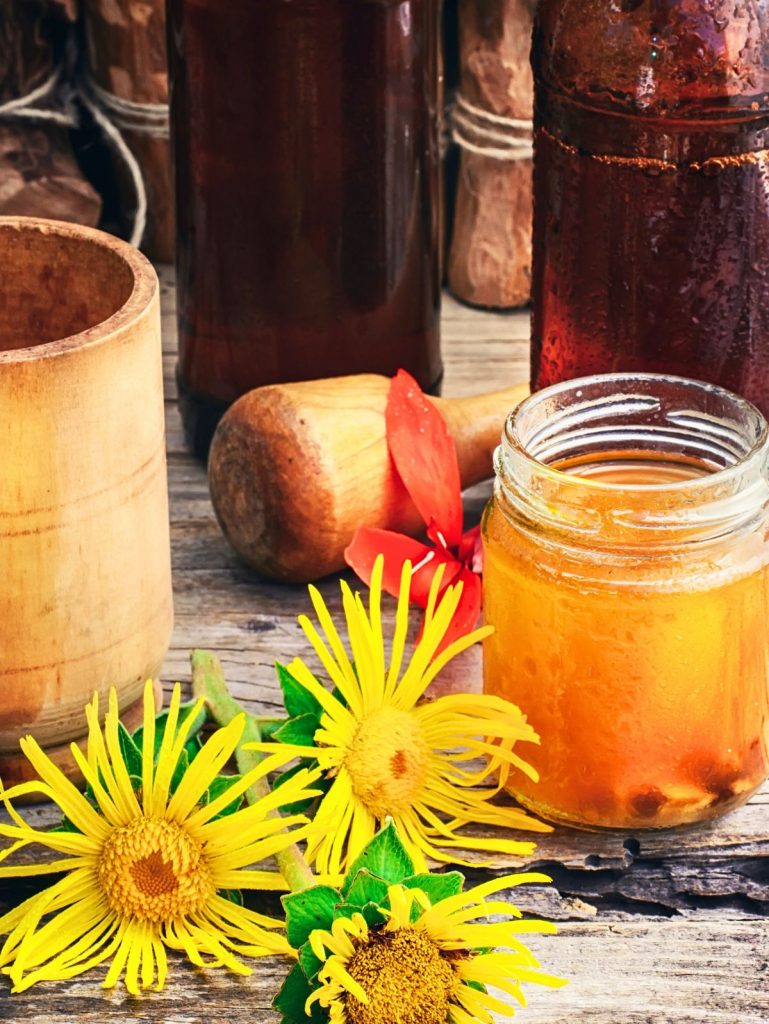
Ingredients for Elecampane Syrup
Creating your own elecampane syrup is an enjoyable and fulfilling experience. You’ll not only craft a delicious herbal remedy but also gain a deeper understanding of the ingredients that make it powerful. Ready to dive into the essential components of this homemade cough syrup? Let’s explore the role of each ingredient in bringing this syrup to life.
Essential Ingredients
To make a soothing and effective herbal cough syrup, you’ll need a handful of essential ingredients. These ingredients work together like a well-rehearsed orchestra, each playing its part in orchestrating a masterpiece for your respiratory health.
1. Elecampane Root (Inula helenium)
- The star of the show is the elecampane root, known for its wonderful benefits for the respiratory system. It’s packed with volatile oils and acts as an expectorant herb, which means it helps clear mucus and soothes sore throats. Whether you use fresh roots or dried roots, this is the foundation of your elecampane syrup.
2. Apple Cider Vinegar
- This magical liquid isn’t just for salad dressings. Apple cider vinegar offers its powers here by acting as a preservative and extracting the goodness from the herbs. Its acetic acid content provides benefits that support the immune system and extends the shelf life of your syrup.
3. Ginger Root (Fresh or Dried)
- Ginger root, often found in traditional Chinese medicine, brings a spicy heat to the syrup. It’s a pungent herb with essential oils that can help soothe the mucous membranes and promote circulation. Whether fresh ginger or dried ginger, its zingy punch is a great example of using simple ingredients to support immune health.
4. Cinnamon Sticks
- Don’t underestimate the humble cinnamon sticks. They’re not just for your grandma’s apple pie. In this recipe, they add warmth and flavor while also contributing to overall immune support. Cinnamon works hand-in-hand with ginger, creating a delightful balance between spicy and sweet.
5. Raw Honey
- This sweet nectar acts as a natural preservative, while its soothing properties make it a cough suppressant for those annoying dry coughs. A cup of honey not only sweetens the mixture but also helps fight off germs with its antibacterial qualities.
These essential ingredients combine to create an effective remedy that cares for your body during the winter months. They’re like nature’s superheroes, standing guard over your health.
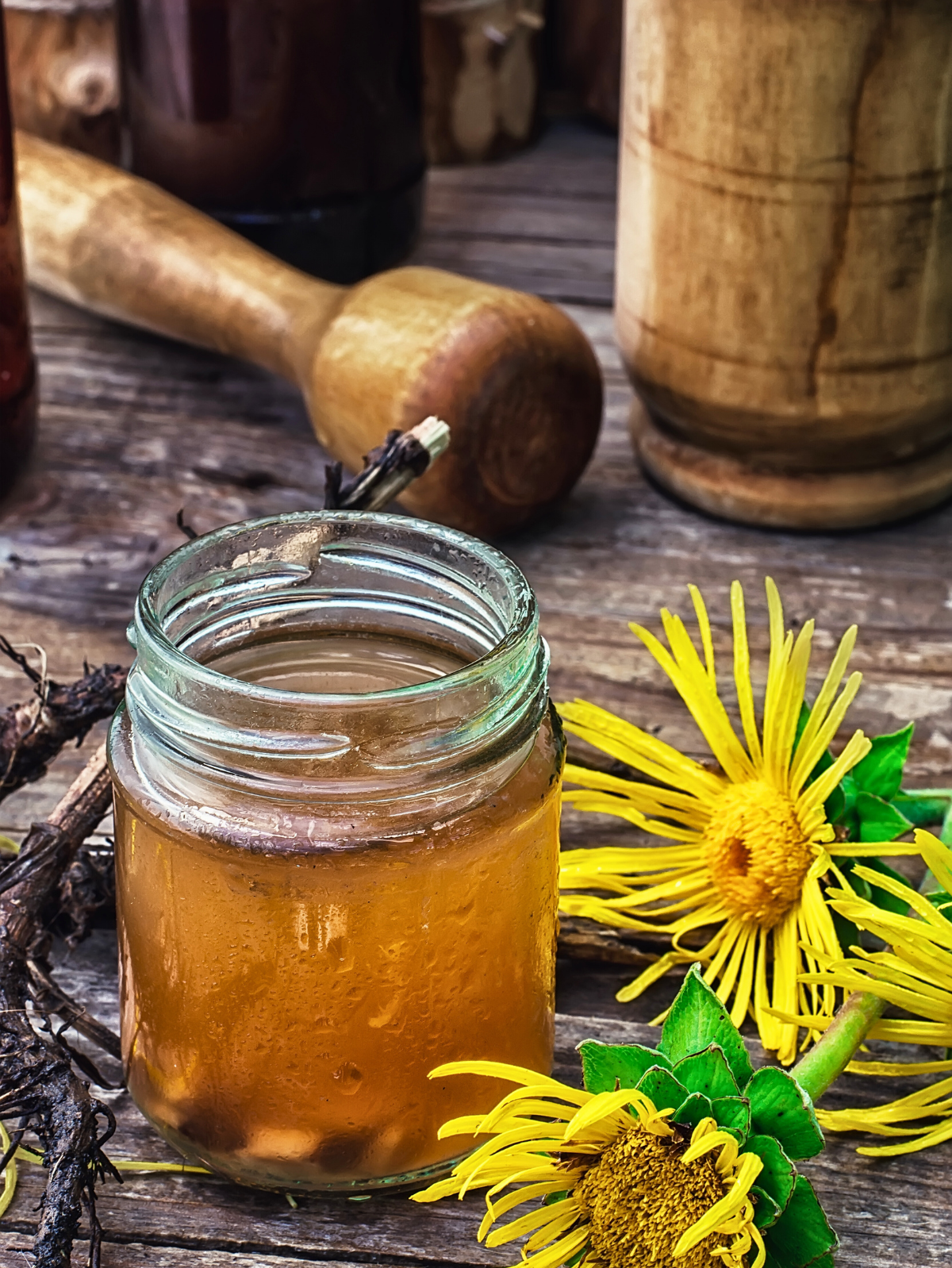
Easy Elecampane Syrup Recipe
Hey there, health explorers! Ready to whip up a magical potion that soothes sore throats and boosts your immune system? Let’s dive into the delightful world of Elecampane Syrup. This homemade cough syrup is perfect for the winter months, tackling unproductive coughs and respiratory infections with ease.
Preparation Steps
Creating your own elecampane syrup starts with choosing the right ingredients. Fresh elecampane root is your star player, serving as a powerhouse for respiratory health. If you can’t find fresh roots, dried ones work too. But remember, a fresh root offers a symphony of flavors you don’t want to miss.
- Gather Ingredients:
- Fresh or dried elecampane root
- Fresh ginger root
- Raw honey
- Cinnamon sticks
- Apple cider vinegar
- Get Ready: Wash the elecampane root thoroughly. If you’re using dried roots, soak them in cold water for 30 minutes to awaken their potential.
- Chop and Combine: Dice the elecampane and ginger roots. Place them into a pint jar and add a touch of apple cider vinegar to marry the flavors.
- Slow Simmer: Pour honey over the root mix, ensuring it fully covers the roots. Cook over low heat — gentle warmth is key to extracting the volatile oils without burning them.
- Stir Occasionally: Allow the concoction to simmer for about an hour, stirring occasionally. You’re aiming for a delightful color change and aroma!
Why low heat? High heat destroys the beneficial properties, much like a sunburn ruins a beach day. Low heat ensures you get all those essential oils and healing goodness.
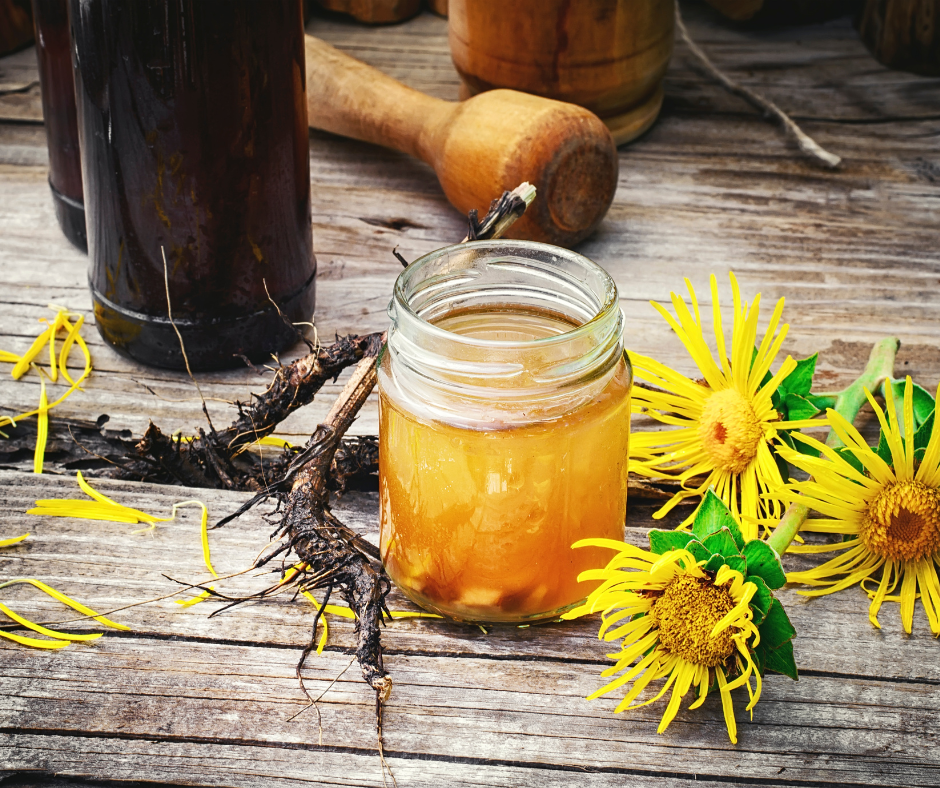
Straining the Herbs
Once your syrup has simmered to perfection, straining the herbs is your next mission. Think of it like sifting for gold, where you’re left with the pure essence of your magical syrup.
- Use a fine mesh strainer or cheesecloth to strain the syrup into a clean container. Patience is your friend here, as rushing might let unwanted bits through.
- Ensure every drop is squeezed out by gently pressing the herbs. The liquid gold that remains is your treasure.
- Store your syrup in a cool dark place, ideally in an airtight container at room temperature. This magical potion can accompany your medicine chest for a few weeks, providing relief as a cough suppressant or part of a broader spectrum of herbal remedies.
So there you have it! Your very own elecampane cough syrup recipe. For those who enjoy exploring herbal drinks and herbal tea recipes, you might find elecampane tincture or elecampane tea exciting alternatives. Whether you’re warding off pesky colds or simply adding to your collection of herbal medicine, elecampane syrup is here to support you every step of the way.
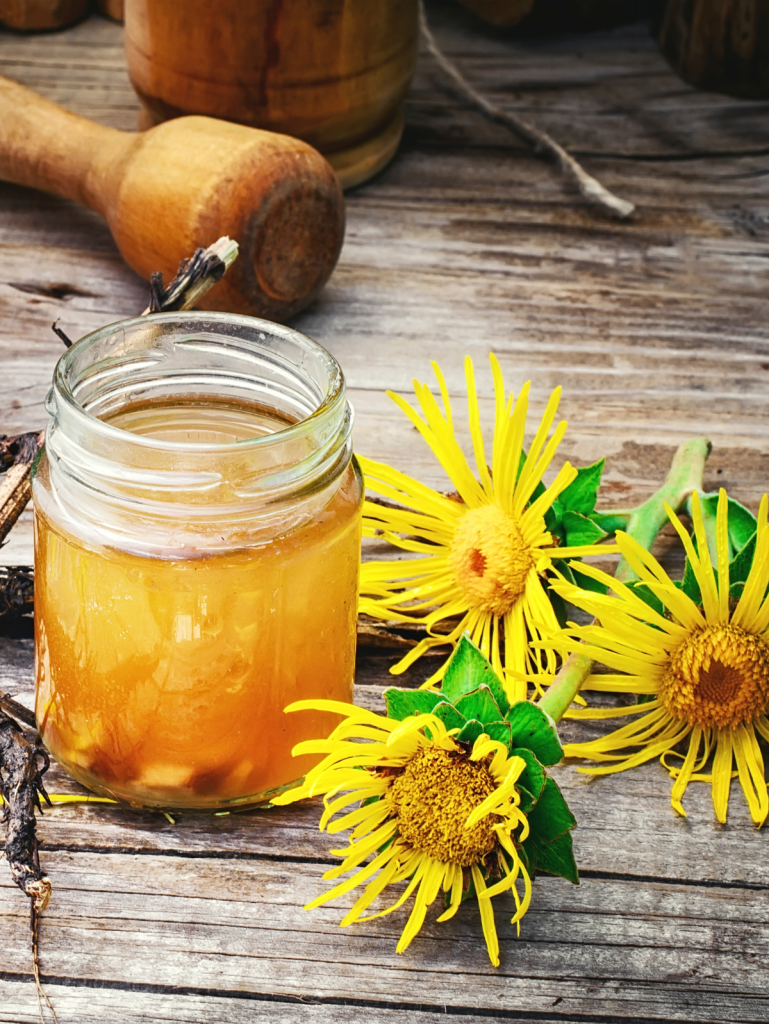
Using Elecampane Syrup
Elecampane syrup is like a trusty sidekick for your immune system. This herbal cough syrup recipe is an old favorite for soothing sore throats and calming pesky unproductive coughs. Think of it as a gentle hug for your respiratory system, wrapping it in a comfy blanket of herbal goodness. Here’s how you can maximize elecampane syrup’s benefits with some smart combinations and proper storage.
Mixing with Other Herbal Remedies
Why not blend elecampane syrup with other herbal remedies for a more powerful punch? By teaming it up with elderberry syrup and echinacea tincture, you create an effective blend of elder for enhanced immune support. This herbal trio can be your go-to during the winter months, giving your respiratory health a fighting chance against infections.
- Elderberry syrup is known for its high vitamin C content. It helps to boost the immune system and is particularly good for battling the cold and flu season.
- Echinacea tincture acts like a shield, offering support against colds and respiratory infections. Pairing it with elecampane syrup may be the effective way to protect your health.
Combining these herbal formulas is like assembling a team of superheroes, ready to tackle any rogue germ that crosses your path.
Storage Tips
Got a bottle of homemade elecampane syrup? Let’s make sure you store it right! The last thing you want is your precious syrup losing its potent benefits. Here’s how to keep it in tip-top shape:
- Cool, Dark Place: Your syrup’s happy place is in a cool dark place away from direct sunlight. Think of it as storing a treasure chest in a secret cave.
- Room Temperature: Keep it at room temperature, away from heat sources. A pantry or kitchen cabinet works wonders.
- Shelf Life: When stored properly, your elecampane syrup should last up to six months. Always check for a color change or unusual smell before using.
Treat your syrup with a bit of love, and it will be there for you in times of need, offering bronchial support just when you need it the most.
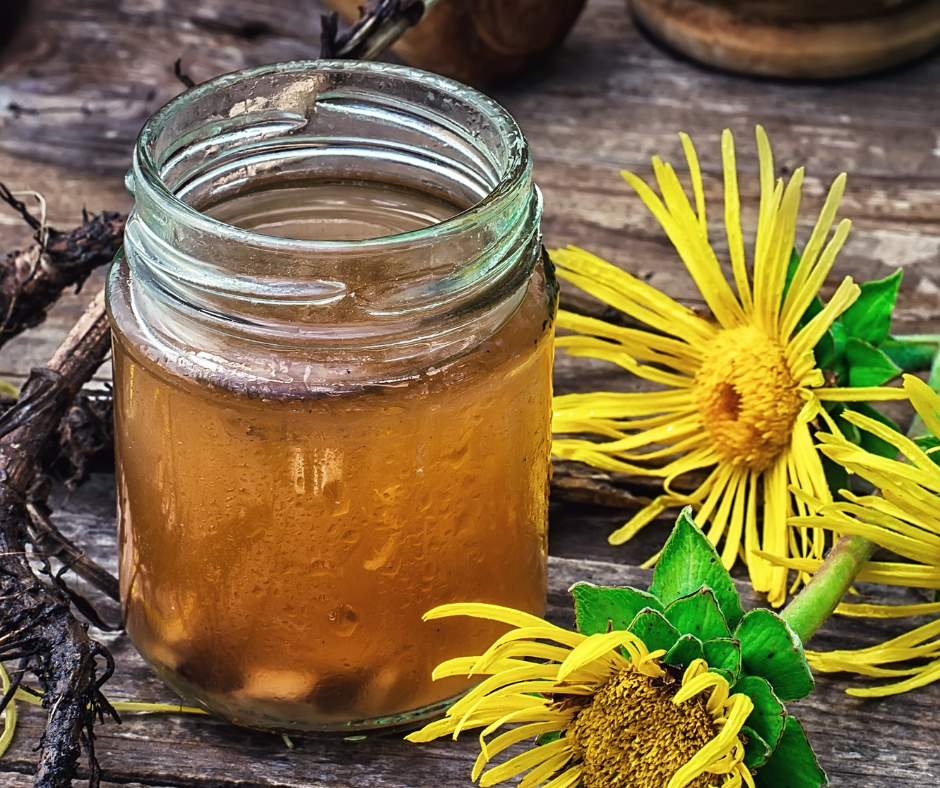
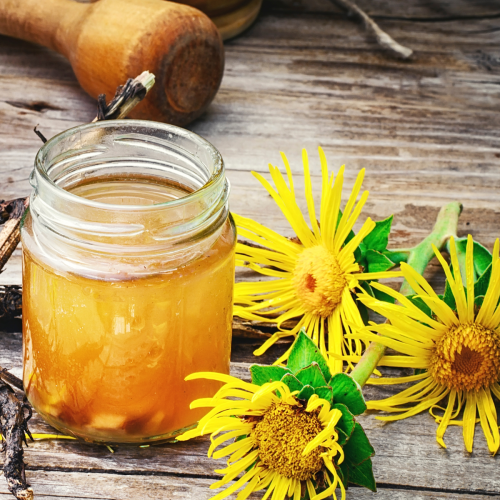
Honey Elecampane Syrup
Ingredients
- 1/3 cup elecampane root
- 2 TBSP Fresh ginger root
- 1 cup Raw honey
- 1 Cinnamon sticks
- Apple cider vinegar splash
Instructions
- Get Ready: Wash the elecampane root thoroughly. If you’re using dried roots, soak them in cold water for 30 minutes to awaken their potential.
- Chop and Combine: Dice the elecampane and ginger roots. Place them into a pint jar and add a touch of apple cider vinegar to marry the flavors.
- Slow Simmer: Pour honey over the root mix, ensuring it fully covers the roots. Cook over low heat — gentle warmth is key to extracting the volatile oils without burning them.
- Stir Occasionally: Allow the concoction to simmer for about an hour, stirring occasionally. You’re aiming for a delightful color change and aroma!


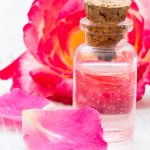
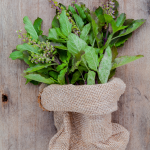
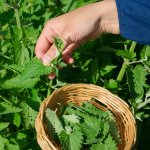
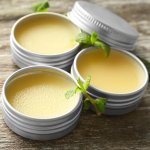

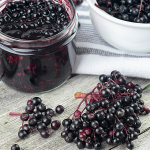
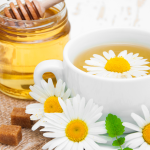

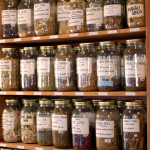
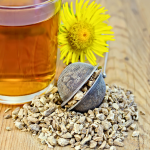
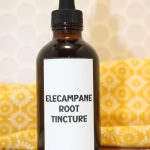
Leave a Reply